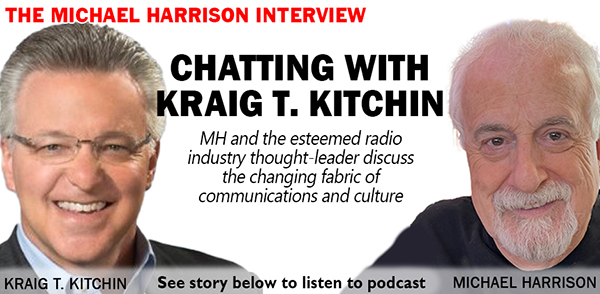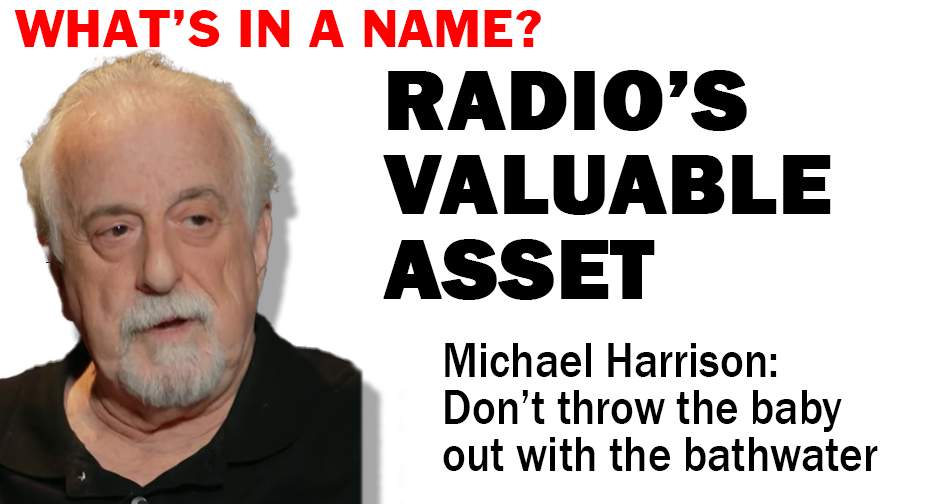By Michael Harrison
TALKERS
Publisher
 There are media and there are media. There are platforms and there are platforms. Not all cultural artifacts are equal in terms of their utilitarian versus cultural value. Damn the tone-deaf corporate bean counters who are ripping the heart out of the spirit that gives humanity its life force! Marketplace obsolescence should not solely be determined by profit and loss. With all due respect to the idea of public service, what about the concept of loyalty? Shame on the automobile industry! Not only is it turning its back on the needs of millions of people, it is in the process of betraying one of its historic partners in not only commerce – but romance and glory. In other words, the automobile industry owes the radio industry a huge debt. The relationship between cars and radios goes a century deep and has been nothing less than a two-way street. Yes, auto industry, don’t be so hasty to save a few bucks by rushing AM (and then FM) radio out the door. You might just find in the long run that “radio” outlasts the private “car” as a fixture of human activity.
There are media and there are media. There are platforms and there are platforms. Not all cultural artifacts are equal in terms of their utilitarian versus cultural value. Damn the tone-deaf corporate bean counters who are ripping the heart out of the spirit that gives humanity its life force! Marketplace obsolescence should not solely be determined by profit and loss. With all due respect to the idea of public service, what about the concept of loyalty? Shame on the automobile industry! Not only is it turning its back on the needs of millions of people, it is in the process of betraying one of its historic partners in not only commerce – but romance and glory. In other words, the automobile industry owes the radio industry a huge debt. The relationship between cars and radios goes a century deep and has been nothing less than a two-way street. Yes, auto industry, don’t be so hasty to save a few bucks by rushing AM (and then FM) radio out the door. You might just find in the long run that “radio” outlasts the private “car” as a fixture of human activity.
A radio is not a cassette, CD, or 8-track player. A radio is a magic box that embodies a century of culture during which it spun the idea that taking a car ride is a lot more soulful than spending time getting from point A to B via the subway, bus, or plane. The car has been the perfect radio-listening chamber and radio has returned the favor in spades with its music and DJs glorifying everything from little deuce coups to Cadillacs to the T-Bird that daddy took away – not to mention bolstering the ubiquitous culture of automobiles with traffic reports, news, weather, and endless references to this particular form of transportation as being a key component of what it is to be a member of society. Radio has provided the car biz with a century long, non-stop free or generously bonused commercial!
From a purely economic position of self-interest and greed, it is understandable why car manufacturers might consider AM radios expendable and are eager to toss them out like the aforementioned obsolete devices of music conveyance. So, what if millions of people still listen to it and DEPEND on it for free speech, religious expression, ethnic connection, demographic habit and public safety. Couldn’t the car manufacturers wait another decade before turning its back on such an important – and still vital – relationship?
Hey auto industry, be careful what you’re doing. You’re severely mistaken if you think your poop doesn’t stink and your place in our rapidly changing society is guaranteed. You might find rolling along in this brave new world without radio turns out to be a very dangerous road.
Michael Harrison is the publisher of TALKERS and can be reached via email at michael@talkers.com. Meet Michael Harrison at TALKERS 2023 on Friday, June 2 at Hofstra University.
Share this with your network
 nominees to be voted upon by industry personnel later this year, leading to the selection of the 2024 Radio Hall of Fame Induction Class. Kraig T. Kitchin, co-chairman of the Radio Hall of Fame, comments, “The input from fellow radio industry members and listeners alike helps our nominating committee contemplate so many more individuals worthy of a nomination. We’re grateful for the input and the ideas offered.”
nominees to be voted upon by industry personnel later this year, leading to the selection of the 2024 Radio Hall of Fame Induction Class. Kraig T. Kitchin, co-chairman of the Radio Hall of Fame, comments, “The input from fellow radio industry members and listeners alike helps our nominating committee contemplate so many more individuals worthy of a nomination. We’re grateful for the input and the ideas offered.”



 There are media and there are media. There are platforms and there are platforms. Not all cultural artifacts are equal in terms of their utilitarian versus cultural value. Damn the tone-deaf corporate bean counters who are ripping the heart out of the spirit that gives humanity its life force! Marketplace obsolescence should not solely be determined by profit and loss. With all due respect to the idea of public service, what about the concept of loyalty? Shame on the automobile industry! Not only is it turning its back on the needs of millions of people, it is in the process of betraying one of its historic partners in not only commerce – but romance and glory. In other words, the automobile industry owes the radio industry a huge debt. The relationship between cars and radios goes a century deep and has been nothing less than a two-way street. Yes, auto industry, don’t be so hasty to save a few bucks by rushing AM (and then FM) radio out the door. You might just find in the long run that “radio” outlasts the private “car” as a fixture of human activity.
There are media and there are media. There are platforms and there are platforms. Not all cultural artifacts are equal in terms of their utilitarian versus cultural value. Damn the tone-deaf corporate bean counters who are ripping the heart out of the spirit that gives humanity its life force! Marketplace obsolescence should not solely be determined by profit and loss. With all due respect to the idea of public service, what about the concept of loyalty? Shame on the automobile industry! Not only is it turning its back on the needs of millions of people, it is in the process of betraying one of its historic partners in not only commerce – but romance and glory. In other words, the automobile industry owes the radio industry a huge debt. The relationship between cars and radios goes a century deep and has been nothing less than a two-way street. Yes, auto industry, don’t be so hasty to save a few bucks by rushing AM (and then FM) radio out the door. You might just find in the long run that “radio” outlasts the private “car” as a fixture of human activity. from digital sales in 2023 and more local ad revenue coming from video streaming than audio streaming spots.” RAB president and CEO Erica Farber comments, “Digital continues to be the catalyst for growth in today’s environment. A solid foundation in digital is a key driver for today’s successful marketing professional. As technology evolves, revenue and sales gains can only be obtained via digital services and training know-how. RAB continues to provide the training, tools and services needed to realize these gains.” The annual report shows that digital sales in 2022 comprised 19% of total ad revenue, representing between $85,064 for the average small-market station and $1.2 million for a station in a large market. Some market clusters were making tens of millions of dollars from digital ad sales. The full report – an analysis of online ad revenue from 3,753 radio stations, as well as survey responses from 851 local radio buyers and 169 radio managers – is available to RAB members.
from digital sales in 2023 and more local ad revenue coming from video streaming than audio streaming spots.” RAB president and CEO Erica Farber comments, “Digital continues to be the catalyst for growth in today’s environment. A solid foundation in digital is a key driver for today’s successful marketing professional. As technology evolves, revenue and sales gains can only be obtained via digital services and training know-how. RAB continues to provide the training, tools and services needed to realize these gains.” The annual report shows that digital sales in 2022 comprised 19% of total ad revenue, representing between $85,064 for the average small-market station and $1.2 million for a station in a large market. Some market clusters were making tens of millions of dollars from digital ad sales. The full report – an analysis of online ad revenue from 3,753 radio stations, as well as survey responses from 851 local radio buyers and 169 radio managers – is available to RAB members.